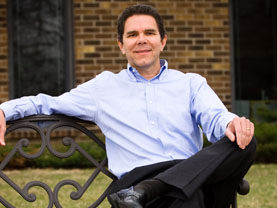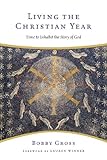
Here at the ESN blog, one of our main topics is spiritual formation in higher ed: Christian practices like prayer and Bible study that shape us more and more into the image of Christ. The stress of Christmas may seem to be an unlikely time for spiritual growth, but for centuries, Christians have set aside the season of Advent as a time of spiritual preparation.
I had the opportunity to interview Bobby Gross, Vice-President InterVarsity Graduate and Faculty Ministries about his book, Living the Christian Year: Time to Inhabit the Story of God, to learn more about the meaning of Advent and how Christians in the academy could benefit from its observance. Bobby has served InterVarsity in many capacities: as a campus staff worker at the University of Florida, a staff supervisor in Florida, the Southeast, and New York/New Jersey, and a national field director based in Atlanta
Photo by Per Ola Wiberg via Flickr
Micheal Hickerson: How did you come to write a book about living out the Christian year? You’ve told me this wasn’t part of your background growing up.
Bobby Gross: I grew up in a Southern Baptist church and then worshipped in a variety of evangelical churches, but was never part of a church that was particularly liturgical or did anything with the Christian year. In my second year of marriage, my wife Charlene and I moved to Miami and we looked for a church together. She grew up Catholic, and we were wide open to any number of churches – we wanted our church to be smaller rather than larger, multiethnic, spiritually alive, Bible-centered. The church that caught our attention, from an ad in the paper, was a small Episcopal church. We went to visit, and it met all our criteria.
 Charlene was immediately at home and more or less knew what to do in the service. I was lost for some months, really, but I stuck it out and slowly began to appreciate the beauty and the power of the liturgy as framing our weekly worship. Then, in the course of being in the Episcopal tradition, I learned about the Christian calendar and the way that liturgical rhythm, over the whole year, can give shape and meaning to our spiritual lives and reflections. Working for a broadly evangelical organization, I found myself many times frustrated and saddened by the lack of awareness, even interest, of many churches and many Christians in this tradition and practice that goes back to within a few hundred years of Christ’s life. So I was motivated to write a book that could bridge from the liturgical world over to those who are not part of those kinds of churches. I wanted to make the bridge easy for evangelicals to walk across so that it would feel inviting and helpful to them.
Charlene was immediately at home and more or less knew what to do in the service. I was lost for some months, really, but I stuck it out and slowly began to appreciate the beauty and the power of the liturgy as framing our weekly worship. Then, in the course of being in the Episcopal tradition, I learned about the Christian calendar and the way that liturgical rhythm, over the whole year, can give shape and meaning to our spiritual lives and reflections. Working for a broadly evangelical organization, I found myself many times frustrated and saddened by the lack of awareness, even interest, of many churches and many Christians in this tradition and practice that goes back to within a few hundred years of Christ’s life. So I was motivated to write a book that could bridge from the liturgical world over to those who are not part of those kinds of churches. I wanted to make the bridge easy for evangelicals to walk across so that it would feel inviting and helpful to them.
MH: We have similar backgrounds. I grew up Southern Baptist as well and then worshipped at an Anglican church while I was in Canada for my master’s degree. Many people from Baptist or other non-liturgical backgrounds are often suspicious of adopting practices for which we don’t see direct Biblical connections. What are the benefits of observing the Christian year?
BG: First of all, let me point out the Biblical underpinnings for this practice. What’s striking in the Old Testament is that God himself, for his people, instituted a calendar with regular festivals, including pilgrimage. The Jewish year was oriented around certain festivals and certain points of remembrance. The most important, of course, was the remembering of the Exodus by celebrating the Passover. For Jesus, this was part of his life – the festivals, the pilgrimages, the Passover meal, as well as worship in the synagogue. Then, in the New Testament, the early church chose to make the first day of the week, which was a workday, the day of worship and the day they set aside for Sabbath rest and observance. They took an ordinary workday and sanctified it as a day of worship. They set it apart. They sacralized time at that point, because it was connected to the event of the resurrection and all that it means. Whenever they worshipped on that day, they were looking at time through a different lens and looking at their week through a different lens. Not only that, but the institution of the Lord’s Supper, the communion, the sacramental experience is akin to the Jewish year. Every time we do the Eucharist there’s a powerful looking back, a remembering. It’s an active remembering that brings some kind of spiritual power from what God has done in our past into our present experience. There’s a grace that comes to us. At the same time, every Communion is a looking forward to the feast that’s promised in the New Heavens and the New Earth. There’s an element of hope. The premise of my book is that the Christian year, by its rhythms, allows us an opportunity to both look back and remember the story of Christ, and to look forward to its ultimate conclusion. The Christian year participates in that same sacramental pattern that God instituted and blessed for the people in the Old Testament and the New Testament, to help us remember in a very active way and anticipate in a way that brings grace into our present spiritual experience.
MH: I recently read Robert Webber’s book on “Ancient Future” worship, and he writes of worship as historical proclamation plus dramatic reenactment.
BG: Correct. You can think of the year as organized into two major cycles. The first you could call the “cycle of light” – Advent, Christmas, Epiphany. Advent becomes the period of preparation and anticipation. The Twelve Days of Christmas is a time of intensive and joyful celebration of the Christ entering history, the incarnation. Epiphany is a period of working that out, proclaiming that, being the light of Christ in the world over those weeks after Christmas. Similarly, there’s the cycle around Holy Week. Lent allows us to prepare in a very thoughtful reflective way. It deepens our readiness to enter into the great mysteries of Holy Week, particularly the Paschal Triduum, the great three days of Good Friday, Holy Saturday, Easter Sunday. Then, in the calendar, we spend the next seven weeks after Easter [until Pentecost] as an extended season of celebration and proclamation as well. So that pattern of preparation, celebration, and proclamation animates the cycles of the Christian year.
MH: Advent is beginning very soon. I don’t think I even knew what Advent was until I was in college. For a Christian who’s familiar with Christmas but maybe not as familiar with Advent, what is Advent and what does it mean?
BG: The term “advent” means the “coming” of something. In Advent we’re doing two things simultaneously over the three to four weeks, beginning on the fourth Sunday before Christmas day. We are first in a way identifying with the prophets who anticipated a coming messiah who would put the world right. We still do that. We long for the return of Christ to remake the heavens and the earth into a redeemed place for his people. So we are alert to the promise of Christ’s return.

As we get closer to Christmas, we switch to the perspective of Mary, who is anticipating the coming of the promise of God in her own experience. She’s pregnant with Jesus, this baby is to be born, and all these prophecies have been spoken. So we’re also trying to put ourselves back into that time when Christ entered the world in the flesh, the word became flesh, born of the Virgin Mary. During Advent, we’re anticipating Christ coming vicariously in the past, we’re anticipating his coming again in the future, and spiritually we’re asking for him to come afresh in our own experience. The weeks, in contrast to all the Christmas craziness, ask us to be thoughtful and entering into that spirit of waiting, anticipation, and reflection. For some of us, it means lament because the world is so broken, and there’s so much darkness in the world. For some, there’s a great joyful anticipation of Christmas. It’s time of preparation, waiting, so that we are then positioned to get the most out of Christmas itself and the twelve days we’re given to celebrate and enjoy Christmas.
MH: For someone in the academic environment, a student or faculty member, the time between Thanksgiving and Christmas can be especially busy. In addition to the normal preparations, there are also finals, papers, and grading. How would you advise someone in the academic environment on observing Advent, particularly if it’s the first time they’re trying to observe the Christian year?
BG: In the book, in the section called “Inhabiting Advent” [pages 44 – 48 -Ed.] I make some practical suggestions while acknowledging that it’s hard to practice these things in the midst of what the world calls “Christmas season” in December. One pair of suggestions is to practice restraint and to practice retreat. For academics, it’s very busy, whether you’re preparing tests and giving tests and grading papers, or whether you’re studying for tests and taking them as a student. Then, maybe, when all that’s over, there’s a mad scramble to buy your presents, to travel home, and all of those dynamics. It’s important to say somewhere in here, “I’m not going to give in to all of the cultural impulses to buy, to do, to go, to be at this party, to send cards to everybody. Somewhere in here, I’m going to resist those expectations and practice a little more restraint. I’m going to translate some of the time that I might save into some moments or some hours, maybe a day, of retreat and reflection, so that I can enter into this great mystery of God become human in history.” The other suggestion I make in the book is to imitate Mary, in contrast to Zechariah, both of whom received annunciations of good news from angels. Try to cultivate an alert and open posture to God’s presence in this season. There’s so much activity and distraction that we have to choose to be spiritually open and alert if we want to receive the benefit. If we just rush through December like everybody else, get to December 26th after Christmas Day, collapse in exhaustion, undecorate the tree, and put it out on the street, we’re forfeiting the chance to dwell in the wonder of God’s love for us in Christ.
MH: Very true. Thank you. I think I’m going to try to do that myself.
Editors note: Over the course of the past several years members of the Emerging Scholars Network have explored a number of aspects of the Christian year, e.g., Advent, Christmas, Epiphany, Lent, Holy Week, Good Friday, Easter, and Pentecost. May you find these pieces a blessing. To God be the glory! 9/2/2016.
Originally published November 23, 2009.
The former Associate Director for the Emerging Scholars Network, Micheal lives in Cincinnati with his wife and three children and works as a web manager for a national storage and organization company. He writes about work, vocation, and finding meaning in what you do at No Small Actors.

A nice piece. It is also nice to contemplate how the Christian year coincides with the seasons and ebb and flow of daylight in the Northern Hemisphere. Advent prepares us in the time of growing night for the moment Christ is born–at the “darkest” time of year. Lent is a period of penance in which the length of the day grows. Jesus’ conception and Easter happen when the light is victorious over dark (or when daylight is longer than night). These patterns were noted by early Christian and medieval writers, but are not discussed as much as they used to be. But it is a nice way to incorporate spiritual practice with an experience of the world that reminds us of God’s grace.